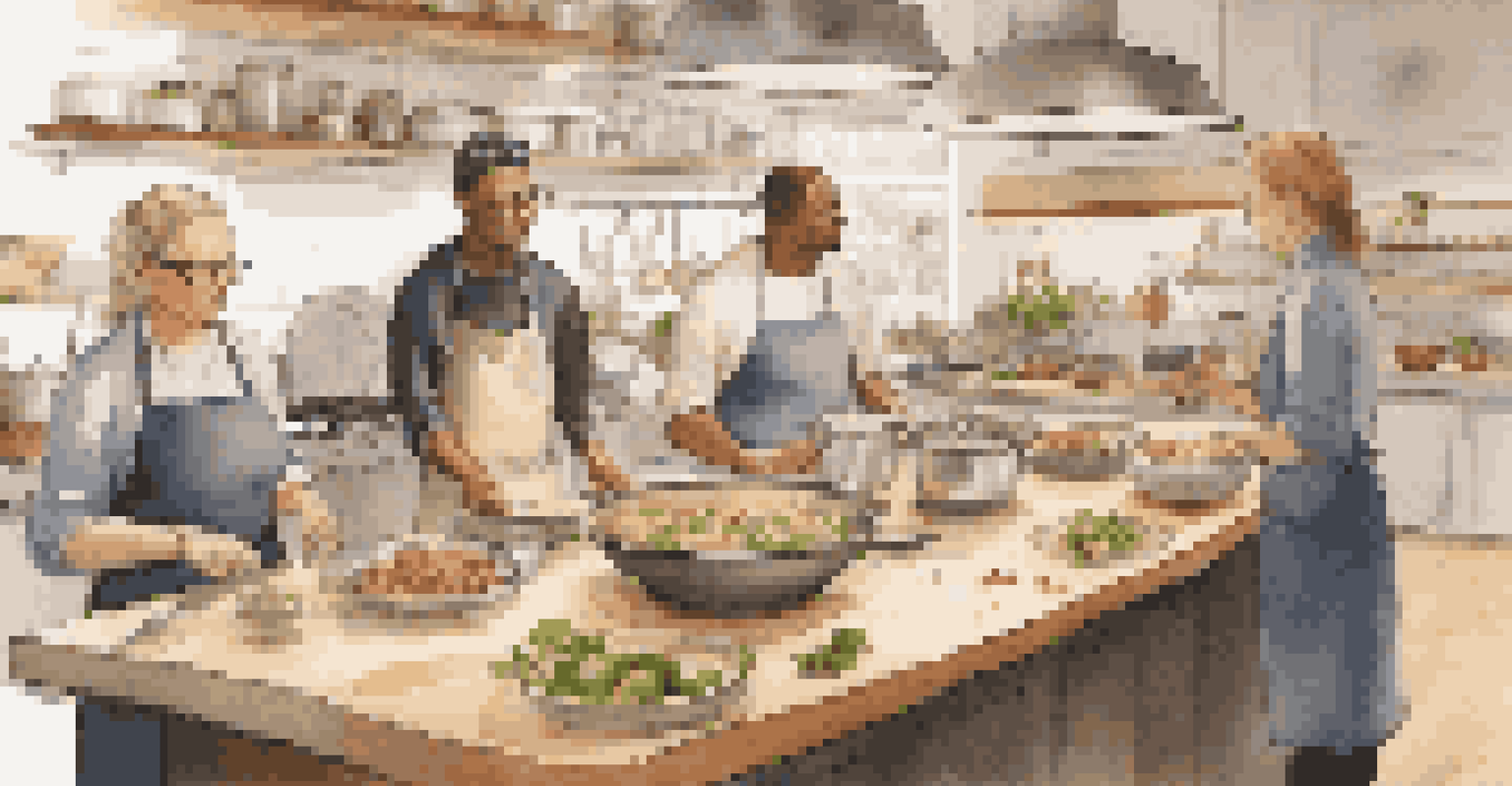The Importance of Cooking Skills in Nutrition Education Programs

Understanding Nutrition Education and Its Goals
Nutrition education aims to empower individuals with knowledge about healthy eating habits. It's not just about telling people what to eat; it's about helping them make informed choices that contribute to overall well-being. This education often includes theoretical aspects of nutrition, but without practical skills, that knowledge can fall flat.
Let food be thy medicine and medicine be thy food.
By integrating cooking skills into these programs, participants can translate nutritional knowledge into everyday practice. For instance, knowing the benefits of vegetables is one thing, but being able to prepare them in tasty ways makes all the difference. This hands-on approach fosters a deeper understanding of food and its preparation.
Ultimately, the goal is to create lasting behavior changes that promote healthy lifestyles. Cooking skills bridge the gap between knowledge and action, encouraging individuals to take charge of their nutrition and health.
Building Confidence in the Kitchen
One of the most significant benefits of teaching cooking skills is the boost in confidence it provides. Many people shy away from cooking due to a lack of experience or fear of failure. However, education programs that incorporate cooking classes help demystify the process, making it approachable and enjoyable.

As participants learn basic cooking techniques, they gain the confidence to experiment with ingredients and recipes. This newfound confidence can lead to healthier eating choices, as individuals are more likely to prepare meals at home rather than resorting to processed foods or takeout.
Empowering Through Cooking Skills
Teaching cooking skills equips individuals with practical abilities that transform their nutritional knowledge into healthy eating habits.
Moreover, cooking skills empower individuals to personalize their meals, accommodating dietary needs and preferences. This level of control over what goes into one’s food can significantly impact health and nutrition.
Fostering Healthy Eating Habits
Cooking skills are essential in fostering healthy eating habits that last a lifetime. When individuals learn to cook, they are more likely to prepare meals that are nutritious and balanced, steering them away from unhealthy fast-food options. This hands-on experience encourages a more thoughtful approach to food selection and preparation.
Cooking is like love. It should be entered into with abandon or not at all.
Through cooking programs, participants can learn the importance of whole foods, portion sizes, and balanced meals. These lessons become second nature, guiding individuals in making healthier choices, even when they aren’t in a cooking class. For example, knowing how to prepare a satisfying salad can encourage someone to choose it over fries.
Additionally, cooking at home often leads to better food quality and nutrition. When you control the ingredients, you can make healthier substitutions, like using whole grains instead of refined options or incorporating more vegetables into meals.
Encouraging Family Participation and Bonding
Cooking skills taught in nutrition education programs can also promote family engagement. When families cook together, they not only learn valuable skills but also create lasting memories. This shared experience can have a profound impact on the eating habits of all family members.
For instance, children who participate in cooking with their parents are more likely to try new foods and develop a positive relationship with healthy eating. When families prepare meals as a unit, it opens the door for discussions about nutrition and healthy choices, reinforcing what participants learn in education programs.
Building Confidence in the Kitchen
Cooking education boosts confidence, encouraging individuals to prepare meals at home and make healthier food choices.
Moreover, shared cooking experiences can strengthen family bonds, fostering communication and teamwork. These moments in the kitchen can become cherished traditions that promote a culture of health within the family.
Addressing Food Insecurity Through Cooking Skills
Nutrition education programs that incorporate cooking skills can play a critical role in addressing food insecurity. Learning to cook with limited resources empowers individuals to make the most of what they have, transforming inexpensive ingredients into nutritious meals. This skill is particularly valuable for those on tight budgets.
By teaching participants how to shop smartly and utilize seasonal produce, programs can help them stretch their food dollars. For example, knowing how to prepare meals from scratch can significantly reduce the reliance on costly pre-packaged foods, which are often less nutritious.
In this way, cooking skills not only enhance nutrition but also promote economic stability. This dual benefit can lead to healthier communities overall, as individuals learn to nourish themselves and their families effectively.
Enhancing Cultural Awareness Through Cooking
Cooking is an incredible way to explore and celebrate cultural diversity. Nutrition education programs that focus on cooking skills can introduce participants to various cuisines and traditional practices. This exposure fosters appreciation for different cultures while also promoting healthy eating.
For instance, learning to prepare dishes from various cultures can highlight the use of specific ingredients that are beneficial for health. This not only enriches participants’ culinary repertoire but also enhances their understanding of nutrition across different dietary patterns.
Fostering Family Engagement
Cooking together as a family not only enhances culinary skills but also strengthens relationships and promotes healthy eating habits.
By integrating cultural cooking lessons, programs can also encourage community building. Participants can share their own family recipes and traditions, creating a sense of belonging and encouraging discussions about health and nutrition in a culturally relevant context.
The Role of Technology in Cooking Skills Education
In today’s digital age, technology plays a pivotal role in enhancing cooking skills education. Online resources, cooking apps, and social media platforms offer a wealth of information and inspiration for learners. These tools can supplement traditional education programs, making cooking skills more accessible than ever.
For example, video tutorials can break down complex cooking techniques into simple, step-by-step instructions. This visual learning approach can be particularly beneficial for those who may struggle with written recipes alone. Participants can practice at their own pace, building confidence along the way.

Moreover, technology fosters a sense of community among learners. Online forums and social media groups allow individuals to share experiences, challenges, and successes, creating a supportive environment that encourages growth in cooking skills and nutrition awareness.
Conclusion: The Lasting Impact of Cooking Skills on Nutrition
The integration of cooking skills into nutrition education programs is not just beneficial; it’s essential for fostering lasting lifestyle changes. By equipping individuals with practical cooking abilities, we empower them to make informed and healthy food choices. This hands-on approach can transform the way people view nutrition.
As participants gain confidence and experience in the kitchen, they become more engaged with their food, leading to healthier eating habits that can last a lifetime. The ripple effect of these skills can be felt not only in individual lives but also within families and communities.
In essence, cooking skills serve as a vital tool in the journey toward better nutrition and wellness. By investing in cooking education, we invest in healthier futures for everyone.